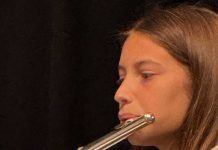Walkouts. Arm bands. T-shirts. Discussion.
These are the many ways local students and schools are dealing
with a possible war with Iraq.
While a national student anti-war walkout took place Wednesday,
San Benito County students have expressed their views on the
possible war by wearing arm bands or T-shirts.
Walkouts. Arm bands. T-shirts. Discussion.
These are the many ways local students and schools are dealing with a possible war with Iraq.
While a national student anti-war walkout took place Wednesday, San Benito County students have expressed their views on the possible war by wearing arm bands or T-shirts. Their shirts have messages written on tape stating “No War” or “Peace.” Even though the majority are against U.S. military force, there is a mix within the student population.
San Benito High School held a Baler Forum this week, a compromise with students who were planning to join the national anti-war walkout. The timing was also bad since students were taking the California High School Exit Exam Tuesday, Wednesday and Thursday.
“Some students wanted to walk out toward Taco Bell. What does that prove?” said Santiago Echaore, vice principal of student management. “They would have had a lot of tag-alongs. … It’s not a safe environment to be out on the streets.”
Instead, Echaore and students compromised for an avenue to express their views, and students were required to submit an eight-sentence paragraph stating why they wanted to attend the forum. The purpose was to weed out students who weren’t serious, Echaore said.
“The kids (organizing the event) wanted committed students,” Echaore said. “A school is supposed to be a learning situation. With your opinion, there’s always another side you have to look at.”
In the paragraphs, students said they wanted to gain more information about the war and learn more about the opinions of their peers.
“I wanted to see what my peers’ opinions were – it could help me decide one way or another,” said SBHS junior Anthony Pulliam about the forum. “… There’s a lot good opinions out there. I wanted to look at what they’re all saying.”
Between 300 and 500 students attended the forum that was held during two periods.
There were times when students were running to grab the microphone during the open mic portion of the 50-minute assemblies. Students who spoke were evenly divided in support of or against the war.
One student said that if the United States doesn’t go to war, we will continue to be attacked. Another said the United States hasn’t proven Iraq has weapons of mass destruction.
Also, Franz Schneider, a Quaker, and Lt. Comm. David Rodriguez with the U.S. Navy presented their views. Schneider supports non-violent methods and Rodriguez detailed the difference between chemical, nuclear and biological weapons.
Discussions are also being held in classes across the county regarding the possible war. Most of Anzar High School’s classes are discussion-oriented, said Principal Charlene McKowen.
All Anzar sophomores take American literature and U.S. history and teachers worked together to present a war unit, McKowen said. The classes discussed World War II and compared it to today’s situation. World history classes have done the same with World War I.
The campus’ Advanced Placement English class has been presenting debates and many of the discussions are politically centered, McKowen said.
While the topic has come up in social science classes at SBHS, not many instructors have time to hold discussions because of the amount of state standards they have to cover, said Louise Ledesma, chairwoman of the Social Sciences Division.
Ledesma, who is just completing a unit on the possible war in her U.S. government classes, has incorporated the Middle East conflict into lessons that cover separation of powers and checks and balances.
“There are lots of opinions, which helps promote a lot of discussion,” Ledesma said.
But, many students don’t know what’s going on. Ledesma said students are “very uninformed.”
“They’re (the students) going to school, going to work, doing their homework. They don’t read …,” she said.
Ledesma had students answer questions about whether the United States should attack Iraq, and the majority of students were undecided about how a war would affect them. Also, students cited cited higher gas prices, more stress and a possible draft as issues.
Students also watched an episode of CNN’s “Crossfire” and analyzed passages of a special report on the possible war in “Newsweek.”
As long as there is news of a possible war, discussions will be continuous, Ledesma said.
“You can’t just do this for a couple of days and then forget about it,” she said.









